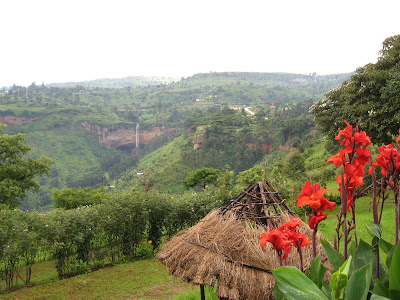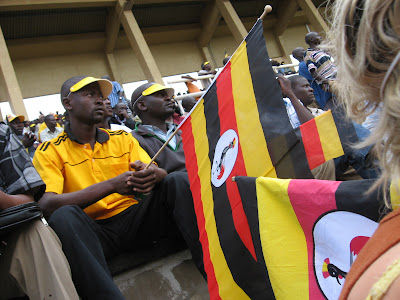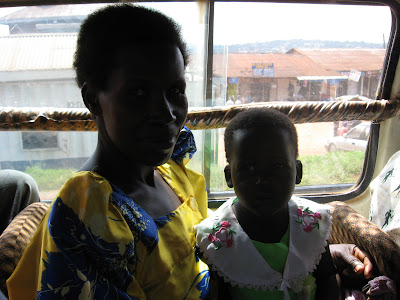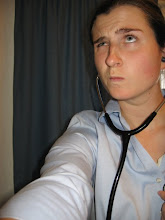What did you do today? Today I learned some really bad words in Ateso, the local language of the Kumi area. How did my vocabulary of Ateso curse words expand so quickly? Read on and you will see...
Yesterday Annie and I watched orthopedic surgeries at Kumi Hospital. They were super cool and most of them were also slightly disgusting to watch. Up on the "disgusting scale" was an older woman with leprosy who had her leg amputated above the knee and a small child that had an infection in her tibia (a bone in the lower part of the leg) and had most of the bone removed and the area cleaned out. I guess bone infections are fairly common here, particularly in children.
This morning we rounded in the orthopedic ward and saw all of the patient who had surgeries yesterday. It was pretty cool. The woman with the amputated leg was sitting up and looking cheerful and happy. Quite impressive.
As we were leaving rounds I saw another physician who said that he was just about to perform a C-section and asked if I would like to watch. I instantly said "Yes!" because I have never seen a C-section and I have really wanted to watch one since I arrived in Uganda. We went down to the surgery theater and I changed into a scrub dress and the physician changed into his scrubs. The patient arrived, but we were waiting for a surgery nurse who was on her way. While we were waiting the physician told me that the had to perform a C-section because the baby was in the transverse position. However, while we were waiting, the physician re-examined the patient and found that the baby had turned and was now in the breech position. C-section deliveries generally more risky than normal vaginal deliveries here, so he told the nurses to take the pregnant patient back to the maternity ward. Slightly disappointed that I wasn't going to watch my first C-section, I asked if I could go back with the woman and watch the natural delivery. It turns out that there was another woman in labor in the maternity ward. So I sat with the midwives and waited for a delivery. We started waiting around noon and I was sure that at any moment a delivery was going to take place.
Labor and contractions are obviously very painful in any culture or country. The women in labor started off just moaning and whimpering when they had a contraction, but gradually the got louder and louder. Soon they were screaming/crying and saying all sorts of things in Ateso. I wanted to go over and hold their hands or rub their backs or do something. However, it appeared to be culturally inappropriate to try to do these things. Both of the women had friends and family (or a husband) present and they were not holding her hand, rubbing her back or anything like that. It is very uncomfortable to watch someone be in pain and not be able to do anything to help. I decided to distract myself by trying to learn some words in the local language, Ateso. Near the beginning of the afternoon a nurse gave a series of instructions to one of the women in labor ('if you walk around, the labor will go faster') and the woman responded by saying, "ebo, ebo, ebo" and proceeded to get up and walk around the room. I asked what "ebo" meant in Ateso and the nurse-midwife told me it means "yes." I was there for 5 hours. I followed the midwives around, watching them give medication, and asking questions about the maternity ward and the surrounding culture. I also continued my language learning whenever someone said a short word in Ateso that sounded like it would be easy to remember. It turned out that the women in labor said words like this frequently. One woman kept saying a word "O****Y! O****Y!" I asked the nurse what this word meant in Ateso. She told me it didn't have a translation in English, but that it was a very bad word that people say when they are in pain or upset that people should say in front of children and that I shouldn't repeat it. I decided this is essentially the definition of a curse word. This processes was repeated again when I asked what another word was that the women in labor were saying and the nurse said responded that it was "another bad word." I tried to block out the words, but every time the women said them, I forced it deeper and deeper into my mind. I was learning bad words in another language all afternoon.
After 5 hours or so of watching the women in labor, the physician came back and decided to do a C-section on the the woman with the breech baby. I scrubbed in again and got to watch my first C-section. It was pretty bloody/messy, but it was fun to watch because it really a happy operation - a baby comes out! They baby and the mom were fine after the surgery.

Me in scrubs waiting for the C-section (the first time). They have these cute little scrub dresses here. They are usually for the nurses, but I wear them sometimes too.

 Here we are before the abseiling (aka repelling). I was pretty scared.
Here we are before the abseiling (aka repelling). I was pretty scared. Here I am going down the cliff next to the water fall. It was a lot of fun after I got used to being scared out of my mind... :) Yes, I am wearing shorts - I figured trying to wear a skirt with the harness wasn't the best idea. It ended up being a lot of fun. Highly recommended for those visiting Sipi Falls.
Here I am going down the cliff next to the water fall. It was a lot of fun after I got used to being scared out of my mind... :) Yes, I am wearing shorts - I figured trying to wear a skirt with the harness wasn't the best idea. It ended up being a lot of fun. Highly recommended for those visiting Sipi Falls. Here we are before the abseiling (aka repelling). I was pretty scared.
Here we are before the abseiling (aka repelling). I was pretty scared. Here I am going down the cliff next to the water fall. It was a lot of fun after I got used to being scared out of my mind... :) Yes, I am wearing shorts - I figured trying to wear a skirt with the harness wasn't the best idea. It ended up being a lot of fun. Highly recommended for those visiting Sipi Falls.
Here I am going down the cliff next to the water fall. It was a lot of fun after I got used to being scared out of my mind... :) Yes, I am wearing shorts - I figured trying to wear a skirt with the harness wasn't the best idea. It ended up being a lot of fun. Highly recommended for those visiting Sipi Falls.









































